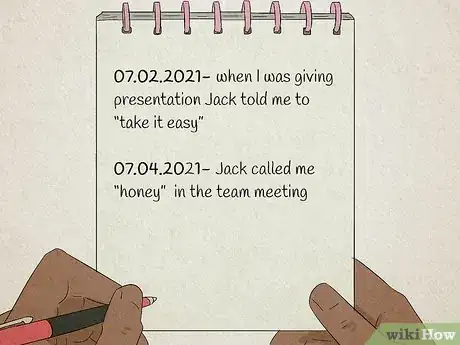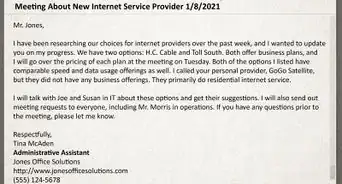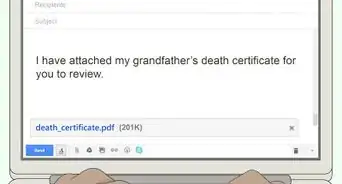This article was co-authored by Frank Blaney. Frank Blaney is a Certified Qigong and Tai Chi Instructor with over 15 years of teaching experience. Passionate about making Qigong more accessible to people, Frank is the author of "Qigong: The Quick & Easy Start-Up Guide." He also holds a 2nd Degree Black Belt in Jujitsu and trains executives and staff of corporations, NGOs, and communities in self-care, personal performance and conflict resolution. He holds an MA in Negotiation, Conflict Resolution, and Peacebuilding from California State University Dominguez Hills.
There are 7 references cited in this article, which can be found at the bottom of the page.
This article has been viewed 34,718 times.
Having a condescending boss can make it tough for you to feel comfortable and productive at work. The good news is that even if you feel powerless, you really aren’t. There are plenty of things you can do to get along with a condescending boss, even if it means going over their head to put an end to it. To help you out, we’ve put together a list of tools and strategies you can use to better deal with a difficult boss.
Steps
Expert Q&A
-
QuestionWhat to do if your boss belittles you in front of others?
 Frank BlaneyFrank Blaney is a Certified Qigong and Tai Chi Instructor with over 15 years of teaching experience. Passionate about making Qigong more accessible to people, Frank is the author of "Qigong: The Quick & Easy Start-Up Guide." He also holds a 2nd Degree Black Belt in Jujitsu and trains executives and staff of corporations, NGOs, and communities in self-care, personal performance and conflict resolution. He holds an MA in Negotiation, Conflict Resolution, and Peacebuilding from California State University Dominguez Hills.
Frank BlaneyFrank Blaney is a Certified Qigong and Tai Chi Instructor with over 15 years of teaching experience. Passionate about making Qigong more accessible to people, Frank is the author of "Qigong: The Quick & Easy Start-Up Guide." He also holds a 2nd Degree Black Belt in Jujitsu and trains executives and staff of corporations, NGOs, and communities in self-care, personal performance and conflict resolution. He holds an MA in Negotiation, Conflict Resolution, and Peacebuilding from California State University Dominguez Hills.
Certified Tai Chi & Qigong Instructor First, talk to your boss as an individual. Do it firmly and respectfully. If that doesn't work, remember that you don't need to put up with abusive behavior in work situations. Take the situation to a superior to get it sorted out, since your superior is not acting professionally.
First, talk to your boss as an individual. Do it firmly and respectfully. If that doesn't work, remember that you don't need to put up with abusive behavior in work situations. Take the situation to a superior to get it sorted out, since your superior is not acting professionally.
Warnings
- Avoid shouting or threatening your boss or you could get fired.⧼thumbs_response⧽
References
- ↑ https://www.forbes.com/sites/work-in-progress/2012/07/03/how-to-deal-with-a-condescending-boss/?sh=8852f61523f3
- ↑ Frank Blaney. Certified Tai Chi & Qigong Instructor. Expert Interview. 28 September 2021.
- ↑ https://www.forbes.com/sites/work-in-progress/2012/07/03/how-to-deal-with-a-condescending-boss/?sh=8852f61523f3
- ↑ https://hbr.org/2018/01/how-to-deal-with-a-passive-aggressive-boss
- ↑ https://hbr.org/2014/12/the-right-way-to-bring-a-problem-to-your-boss
- ↑ https://www.growthbusiness.co.uk/6-ways-counter-condescending-boss-2548689/
- ↑ https://www.psychologytoday.com/us/blog/understand-other-people/201802/dealing-difficult-boss
- ↑ https://www.forbes.com/sites/work-in-progress/2012/07/03/how-to-deal-with-a-condescending-boss/?sh=8852f61523f3
- ↑ https://www.fastcompany.com/40411173/how-to-handle-your-bosss-condescension
- ↑ https://www.fastcompany.com/40411173/how-to-handle-your-bosss-condescension
- ↑ https://www.forbes.com/sites/work-in-progress/2012/07/03/how-to-deal-with-a-condescending-boss/?sh=8852f61523f3
- ↑ Frank Blaney. Certified Tai Chi & Qigong Instructor. Expert Interview. 28 September 2021.
- ↑ https://www.growthbusiness.co.uk/6-ways-counter-condescending-boss-2548689/
- ↑ Frank Blaney. Certified Tai Chi & Qigong Instructor. Expert Interview. 28 September 2021.
- ↑ https://www.growthbusiness.co.uk/6-ways-counter-condescending-boss-2548689/







































































